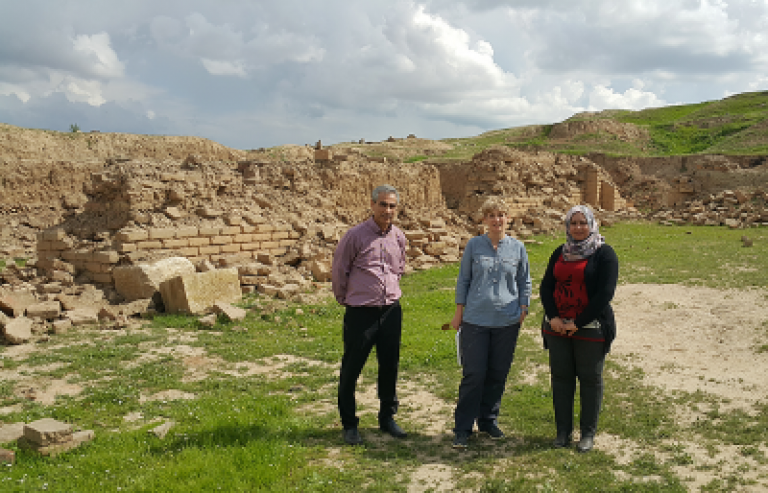In 2017-21 the Nahrein Network was funded by the AHRC-GCRF Network+ Scheme. Here we summarise our achievements during that time.
The Nahrein Network was set up in order to tackle in tandem two challenges presently facing the Middle East:
- the systematic local exclusions from participation in the construction of Middle Eastern antiquity and history; and
- massive population growth, coupled with endemic instability, poverty and youth unemployment.
Nahrein is the Arabic name for Mesopotamia, the area between the two rivers Tigris and Euphrates, centred on modern-day Iraq and northern Syria. The literate, urban cultures of Sumer, Babylonia and Assyria predate Greece and Rome by some millennia. Together with Egypt, they represent the crucial first half of world history.

This new antiquity, re-discovered only in the 19th century, is jeopardised by conflicts tearing the region apart. Since 2014, the destruction of heritage sites throughout Syria and Iraq has received widespread publicity. International aid projects have pumped millions of dollars of aid into the documentation, digitisation, and conservation of threatened and damaged buildings and archaeological sites across the Middle East. However, only a few of these schemes pay much attention to long-term, local interests and impacts.
At the same time, the whole region is struggling with the human effects of war. According to the UNDP's Human Development Report 2016, youth, women and girls, rural dwellers, and those living in conflict-affected areas are the four groups of people most at risk of being 'left behind'. Cultural, ethnic and religious minorities are particularly vulnerable to systemic exclusion.
We enable people across the region to reclaim their ancient heritage as local history, putting it to constructive use for their communities. The Network harnesses interdisciplinary humanities research and education to help Middle Eastern universities, museums, archives and cultural heritage sites build their capacity to contribute to their countries' economic, cultural and social development in the years ahead.
Our aims are described in more detail here.
Work Strands
In 2017-21, the Network carried out three overlapping strands of activity:
1. Initial scoping, capability development and partnership building
This strand hosted focus groups, workshops, and partner-matching for Network participants. In 2018-31, an extensive Visiting Scholarships scheme provided short-term placements in the UK for around 20 Middle Eastern researchers.
2. New funding calls
From 2018 to 2021 we offered a range of large and small grants for collaborative, interdisciplinary research on themes relating to the aim of the Network, open to academic and non-academic applicants alike.
3. Evaluation and legacy planning
It was also important to ensure that the Network's activities and output themselves have a sustainable future. In this strand we secured the long-term future of the Network, and formulated policy guidance on the main themes of our research.
Network Plus
The project was one of a group of international academic networks funded by the Arts and Humanities Research Council and led by universities based in the UK. They were set up to conduct collaborative arts and humanities-based research into some of the world's most pressing development challenges.
The five networks were funded using more than £9m from the Global Challenges Research Fund (GCRF), using the AHRC's 'Network Plus' model. This was designed to bring together a wide range of UK arts and humanities research expertise with researchers and non-academic partners in low and middle income countries.
To find out more about Network Plus, please visit the AHRC website.
GCRF
The Global Challenges Research Fund (GCRF) was a £1.5 billion fund to support cutting-edge research and ensure the UK takes a leading role in global development. By working with world-leading researchers and institutions, the fund contributed to addressing the complex global issues faced by developing countries.
It focused on challenge-led, multidisciplinary research, providing an agile response to emergencies in need of urgent analysis and strengthening the UK and developing countries' capability for research.
GCRF formed part of the UK Government's Official Development Assistance (ODA) commitment and was overseen by the Department for Business, Energy and Industrial Strategy (BEIS).
 Close
Close

